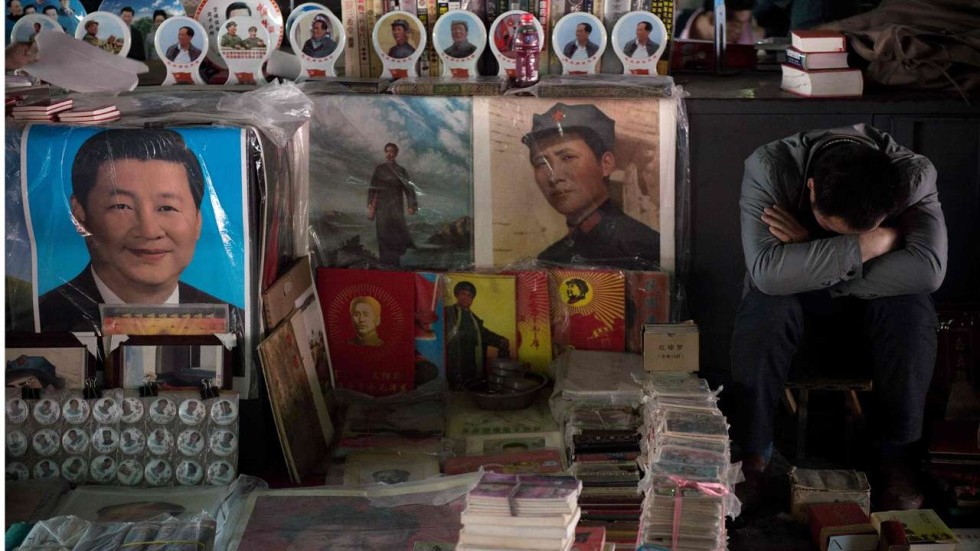Source: SCMP (5/28/16)
Cultural Revolution-style concert was a well-laid trap for Xi Jinping
Kwan Hing-ling believes the organisers of the Beijing concert that created a public uproar had an ulterior motive – to put pressure on the Chinese president to reverse the official verdict on the decade of upheaval
By Kwan Hing-ling
This year marks the 50th anniversary of the start of the Cultural Revolution. Reactions on the mainland had been muted at first, and the Chinese press did not seem particularly interested in reviewing the 10 years of devastating upheaval. But a “red-song concert” this month forced the whole of society to sit up.
“In A Field of Hope”, held on May 2 at the Great Hall of the People, featured performers singing and dancing to revolutionary songs popular during the Cultural Revolution, against a backdrop of propaganda posters and slogans. A display of such nostalgia for the Cultural Revolution – in the political centre of China at this politically sensitive time – raised the alarm for many people.
Those who suffered during the Cultural Revolution were particularly offended. Ma Xiaoli (馬曉力), the daughter of Ma Wenrui (馬文瑞), a former vice-chairman of the Chinese People’s Political Consultative Conference, wrote to Li Zhanshu (栗戰書), director of the General Office of the Communist Party’s Central Committee, criticising the attempt to “recreate the Cultural Revolution”. She requested an investigation and called for vigilance against any resurgence of ultra-leftist idealogy.
Political winds raise red flags over Cultural Revolution-style gala
Attempts to whitewash the Cultural Revolution have surfaced over the past two years, even though a party document, the 1981 “Resolution on Certain Questions in the History of the Party since the Founding of the People’s Republic”, had long ago laid down the official line. It was “a period of civil strife plotted by the leaders and exploited by counter-revolutionary groups, bringing about disaster for the party, the state and the people”, it said.
Rubbish collector sings Mao’s praises as Zhao the PLA veteran
Despite this, some people have been doing everything possible to reverse the verdict. The internet has been full of chatter distorting history, including praise for the Gang of Four. Strangely enough, such absurdities which defied Beijing’s verdict were allowed to spread. By contrast, articles critical of the Cultural Revolution, especially those commenting on errors made by Mao Zedong (毛澤東) in his twilight years, were labelled “improper discussion of central government policy”. Even senior officials have jumped on the bandwagon: the head of the Chinese Academy of Social Sciences recently published a lengthy commentary affirming Mao’s doctrine of “continuing revolution under the dictatorship of proletariat”, the theoretical basis for launching the Cultural Revolution.
The revisionist movement appears to be reaching fever pitch. Commemorative activities looking fondly back on the national disaster have been held across the country. Participants not only criticised reforms and the open-door policy, but also denounced reform-minded state leaders as “capitalist traitors”. Some even called for another Cultural Revolution.
This was the context that led up to the Beijing concert. Despite denials now, there’s no doubt a unit of the Central Propaganda Department gave the green light for the show.
Cultural Revolution was wrong and it will never be allowed to recur: party mouthpiece breaks Chinese media silence over 50th anniversary
The organisers also appear to have had a hidden agenda. Of the 30 songs performed, some were from the Cultural Revolution, including Sailing the Seas Depends on the Helmsman. There were also two songs praising President Xi Jinping (習近平) – Steamed Bun Shop and Don’t Know What to Call You. The first depicts the scene in 2013 when Xi queued up at the Qingfeng Steamed Dumpling Shop in Beijing to buy a meal. The second recalls Xi’s visit to Shibadong village in Huayuan county, in the Xiangxi Tujia and Miao autonomous prefecture in Hunan (湖南). Further, the concert takes its name from In the Field of Hope, the song which made Xi’s folk singer wife, Peng Liyuan (彭麗媛), famous.
Usually at such red concerts, either Mao would be exclusively venerated or a mix of state leaders would take their turns in the limelight. But, notably on May 2, songs praising Deng Xiaoping (鄧小平), Jiang Zemin (江澤民) and Hu Jintao (胡錦濤) were conveniently left out, while only songs about Mao and Xi were performed. Moreover, silhouettes of Mao and Xi alternately appeared as backdrops on stage.
The ideal Chinese husband: Xi Dada and the cult of personality growing around China’s president
Recall the recent social media chatter hailing Xi as the greatest leader since Mao, and an earlier movement in different parts of the country calling Xi the “core” of the Chinese leadership, and it is not difficult to guess that the concert organisers had intended to promote Xi as the heir to Mao’s Cultural Revolution legacy.
Their plan was well thought-out. They were trying to create a fait accompli in order to put pressure on Xi to accept a vindication of the Cultural Revolution. More importantly, they intended to lead Xi into a trap where he would be seen as advocating personality worship. To put this in Ma Xiaoli’s words, such people are digging a hole for Xi to fall into.
In the early 1980s, then party chairman Hua Guofeng (華國鋒) was ousted following accusations of “continuing to advocate the worship of Comrade Mao Zedong while creating the opportunity for and allowing himself to be worshipped”. Were the organisers of the concert trying to recreate similar conditions for such accusations against Xi? Their intentions seem clear – framing Xi by flattering him.
The Cultural Revolution pushed the Chinese nation over the edge. To seek to reverse the verdict on it for any reason goes against the will of the people.
Kwan Hing-ling is a veteran Hong Kong-based journalist. This article is translated from one that originally appeared in SCMP Chinese



